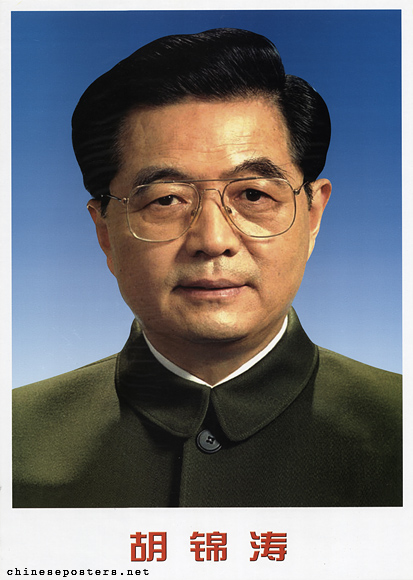More languages
More actions
(Hyperlink) Tag: Visual edit |
No edit summary Tag: Visual edit |
||
| Line 1: | Line 1: | ||
{{Infobox politician|name=Hu Jintao|native_name=胡锦涛|image_size=200|birth_date=21 December 1942|birth_place=Taizhou, Jiangsu, [[Republic of China|China]]|nationality=Chinese|political_orientation=[[Marxism–Leninism]]<br>[[Mao Zedong Thought]]<br>[[Socialism with Chinese Characteristics]] <br> [[Scientific Outlook on Development]]|political_party=[[Communist Party of China]]|image=HuJintao.jpg}}'''Hu Jintao (Simplified Chinese: 胡锦涛; Pinyin: Hújǐntāo)''' (born 21 December 1942) is a retired Chinese politician who was the [[Communist Party of China]]'s General Secretary (2002—2012) and the President of the [[People's Republic of China]](2003—2013) among other positions, many of which were succeeded by now-President [[Xi Jinping]]. | {{Infobox politician|name=Hu Jintao|native_name=胡锦涛|image_size=200|birth_date=21 December 1942|birth_place=Taizhou, Jiangsu, [[Republic of China|China]]|nationality=Chinese|political_orientation=[[Marxism–Leninism]]<br>[[Mao Zedong Thought]]<br>[[Socialism with Chinese Characteristics]] <br> [[Scientific Outlook on Development]]|political_party=[[Communist Party of China]]|image=HuJintao.jpg}}'''Hu Jintao (Simplified Chinese: 胡锦涛; Pinyin: Hújǐntāo)''' (born 21 December 1942) is a retired Chinese politician who was the [[Communist Party of China]]'s General Secretary (2002—2012) and the President of the [[People's Republic of China]] (2003—2013) among other positions, many of which were succeeded by now-President [[Xi Jinping]]. | ||
During his term in office, Hu reintroduced state control in some sectors of the economy that were relaxed by the previous administration. Following the SARS epidemic of 2003, Hu re-introduced universal healthcare to China, which had been unfortunately privatized during the 1980s and 1990s; by 2008, 814 million people were covered through basic healthcare services in China.<ref name="Making a New China ep. 14">https://www.youtube.com/watch?v=xjdiS7tTUF4</ref> By 2011, China succeeded at providing healthcare to 1.3 billion residents.<ref>https://www.sciencedirect.com/science/article/pii/S0168851015001864</ref> | During his term in office, Hu reintroduced state control in some sectors of the economy that were relaxed by the previous administration. Following the SARS epidemic of 2003, Hu re-introduced universal healthcare to China, which had been unfortunately privatized during the 1980s and 1990s; by 2008, 814 million people were covered through basic healthcare services in China.<ref name="Making a New China ep. 14">https://www.youtube.com/watch?v=xjdiS7tTUF4</ref> By 2011, China succeeded at providing healthcare to 1.3 billion residents.<ref>https://www.sciencedirect.com/science/article/pii/S0168851015001864</ref> | ||
Revision as of 00:30, 5 July 2023
Hu Jintao 胡锦涛 | |
|---|---|
 | |
| Born | 21 December 1942 Taizhou, Jiangsu, China |
| Nationality | Chinese |
| Political orientation | Marxism–Leninism Mao Zedong Thought Socialism with Chinese Characteristics Scientific Outlook on Development |
| Political party | Communist Party of China |
Hu Jintao (Simplified Chinese: 胡锦涛; Pinyin: Hújǐntāo) (born 21 December 1942) is a retired Chinese politician who was the Communist Party of China's General Secretary (2002—2012) and the President of the People's Republic of China (2003—2013) among other positions, many of which were succeeded by now-President Xi Jinping.
During his term in office, Hu reintroduced state control in some sectors of the economy that were relaxed by the previous administration. Following the SARS epidemic of 2003, Hu re-introduced universal healthcare to China, which had been unfortunately privatized during the 1980s and 1990s; by 2008, 814 million people were covered through basic healthcare services in China.[1] By 2011, China succeeded at providing healthcare to 1.3 billion residents.[2]
Hu also sought to improve socio-economic equality domestically through the Scientific Outlook on Development, which aimed to build a Harmonious Socialist Society that was prosperous and free of social conflict. In 2007, Hu partially re-introduced the "iron rice bowl" which had been dismantled during the 1980s; while not bringing back lifetime job security, it did bring back a cradle-to-grave social security system.[1]
In foreign policy, Hu advocated for "China's peaceful development", pursuing soft power in international relations and a corporate approach to diplomacy.
